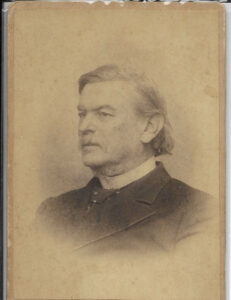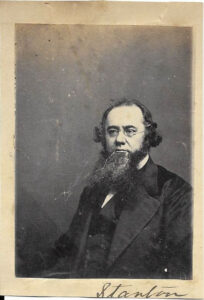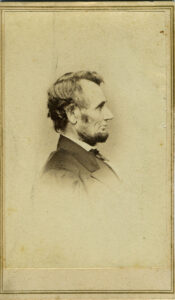June 2, 1864: President Lincoln Meets The Reverend Dr. Joseph Ruggles Wilson Of Georgia At The White House And Endorses A Good-Will Mission.
You are there: In accord with the protocol of the day a visitor wishing to see the U.S. President in person can appear at the White House and be ushered in when his name is called. On June 2, 1864, one such guest is the Reverend Dr. Joseph Ruggles Wilson of Augusta, Georgia.
Wilson is born in Steubenville, Ohio in 1822, the son of a newspaper publisher, successful businessman and an anti-slavery Whig politician. He graduates from Washington & Jefferson College in Pennsylvania in 1844 and from the Princeton Theological Seminary two years later. . In 1849 he marries one Jesse Woodrow and becomes Pastor of Chartiers Presbyterian Church.
When it closes, he teaches the Natural Sciences at Hampton-Sydney College until 1855 when he moves to Virginia as Pastor of the First Church in Staunton.
In 1856, Jesse gives birth to a third child, a son named Woodrow Wilson who, in 1913, will become America’s 38th President.
In 1858 the family moves to the deep South when he becomes Pastor of the First Presbyterian Church of Augusta, Georgia. His family is given a manse to live in which is cared for by slaves owned by the church. His social views are by now well aligned with the region, and in a January 6, 1861 sermon he asserts that human bondage is sanctioned in the Bible, a popular rationale at the time.
It is surely high time that the Bible view of slavery should be examined, and that
we should begin to meet the infidel fanaticism of our infatuated enemies upon the
elevated ground of a divine warrant for the institution we are resolved to cherish.
Much to the chagrin of his Northern relatives, Joseph Wilson goes with the South when the Civil War breaks out. Along with Jesse, he cares for wounded soldiers in his home, and serves for a time as Chaplain of the army. That mission brings him to the White House on June 2, 1864.
His quest is to gain Lincoln’s agreement to an exchange of hospital chaplains he has previously negotiated with Secretary of War Stanton. This would allow Confederate clergy to minister to their wounded in Union sites and vice versa for the US side. Lincoln is sympathetic to the idea, but careful in the endorsement note he hands Wilson to leave the final say back in the hands of his Secretary.
Rev. Dr. Wilson tells me the Sec. of War is willing to make an exchange of Hospital
Chaplains to suit him; and, if so, I have no objection. (signed) A. Lincoln
While the extent of these exchanges is unknown, the role that hospital chaplains played in providing spiritual support to the wounded and dying is evident in the testimonials of soldiers on both sides.



